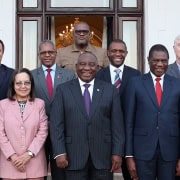|
Getting your Trinity Audio player ready...
|
South Africa’s coalitions across all tiers of government may be here to stay, so there needs to be undisputable trust among – and in – the political parties participating. The public servants who report to the newly formed national and provincial executives must adhere to policies that ensure their professionalism as guided by the Constitution. Their role should not be politically driven, but rather people-driven, encapsulating the national development agenda.
These are some of the sentiments shared during a recent webinar hosted by the National School of Government titled Making Coalitions and Governments of National Unity Work: The Role of Professional Bureaucracies.
Public Service Commission chairperson Professor Somadoda Fikeni noted that none of the political parties in the government of national unity (GNU) appealed in their own right to an overwhelming majority of the electorate, and this is an indicator that South Africans have disengaged from their civic role to the extent that about only half of South Africa’s 30-million eligible voters participated in the May elections. It is on that basis that the political parties at the helm of the GNU must drive a people-focused agenda to regain the trust of the public and put the interests of the public first.
“Between 36-million and 39-million people are 18 years and above in South Africa, therefore eligible to vote. But only 27-million are even registered to vote, and just over 16-million participated in the recent elections, and the largest party is just over 6-million, and the second largest is just over 3.4-million.
“It tells us that the public generally has disengaged. As we talk about the function of public service, and we look at the Afrobarometer and we look at the HSRC result and other results of the opinion surveys which show a legitimacy crisis, a crisis of relevance, that has led to people in the last years not being as enthusiastic in participating in the public and civic life.”
We should be talking about a people-centred public service that is service oriented, that is driven by national interests, Fikeni added. “Not a partocracy on how some parties or a compendium of manifestos are put together, because it’s clear that the parties, even as they win, they win a minority of a minority of those who are participating.”
The professional mandate of the public servants who find themselves working under the newly established executive must use the guidelines of the Constitution and its national interest focus as their compass to guide them in their work, he argued further. That will help in them supporting their respective ministers regardless of differences in political ideologies.
International examples
Earlier in the day the event had gained insights from international and continental examples of how coalitions may or may not work, with sharing of lessons from the experiences of Ireland and Belgium in Europe, and examples closer to home such as Lesotho and Zambia.
Fergus Finlay, who has previously played the role of advisor on coalitions for the Irish government, noted: “The capacity of government to manage events is always determined by the character of the government, by the way in which people can work together, can get together at short notice, and can deal with problems.”
He acknowledged that the environment in that country through which a coalition government was first enabled around the 1980s was prefaced by a violent and turbulent political period for which solutions had to be found that would help unify the people on the ground. The reality in Ireland is a coalition government, owing also in part to the economic difficulties that most governments faced in 2008. It is widely accepted, he added, that no political party will ever have dominance over government again.
“So that political system has had to adapt, adjust, and learn how to make coalitions work. They haven’t always worked, but those that have worked have had a number of features in common.”
His perspective from working for the minority Irish Labour Party was that as a smaller party, it needed to establish its purpose in the coalition to focus its strengths and make the coalition work.
Jan Cornillie, who spoke of the Belgian experience as a former advisor to both government and the Flemish Socialist Party, agreed. His take on the lessons learned is that coalitions are best discussed or negotiated before entering into government, mainly to protect the smaller parties and their ideological dealbreakers. There should also be an overarching narrative, he argued, that is established in which governing parties can find themselves, and it must be premised on what is in the best interest of the public. In addition, there should also be respect for the need to make political compromises, and it should be institutionalised.
Coalitions in Belgium were used to pacify across main political fault lines such as religious, socio-economic, and communitarian, explained Cornillie. They were kept going to advance the economy, among other objectives, and have worked pretty well. The longest coalition negotiation was over 514 days, and while that went on, contingencies were put in place to ensure service delivery, but government was not inclined to make big plans until the negotiations had settled.
Closer to home
The lessons learned from Lesotho had more resonance with South Africa. The former held an election in 2012 that produced a hung government for the first time since 1966. Since then, coalitions have become the norm, albeit not always working, and leading to what Nthabiseng Tlhomola, the director-general for the Lesotho Institute for Public Administration and Management, described as snap elections that had to occur intermittently in between the normal schedule of elections, to help when coalitions did not work.
The situation also gave rise to the establish of the National Development Strategic Plan, the first meant to run from 2012 to 2017, the second from 2018 to 2023, and the third and current running from 2023 to 2028. The plan ensures alignment of ministerial programmes to national priorities irrespective of the political leader in that ministry, and one of its main characteristics is that it has implications on budget allocation for government programmes, so no minister may deviate from it regardless of their political agenda.
Executive director for the Public Affairs Research Institute, Mbongiseni Buthelezi, argued that the context in which South Africa’s coalition government has been established has many implications for service delivery and addressing South Africa’s inequality, in that public servants who have normalised serving the agenda of one political party for many years are now in a position to change their mindsets to accommodate a different working culture.
“The regular work of the state must go on even if there are elections, even if there are negotiations for a GNU. We still need clean water coming out of our taps, we still need medicines to be restocked in our public hospitals, and we need floods responded to where they occur.
“What we are seeing in the GNU is that the incentives structure might be changing for both political office bearers and public servants. For example, ministers and senior civil servants may no longer be comrades from the same political movement and hence what we might be seeing is that accountability mechanisms that are already in place in many instances – but have simply been ignored for the last 20 odd years – might begin to actually work. I have hope that the moment we begin to chart a way forward will take us into a future in which we can get South Africa to work.”








